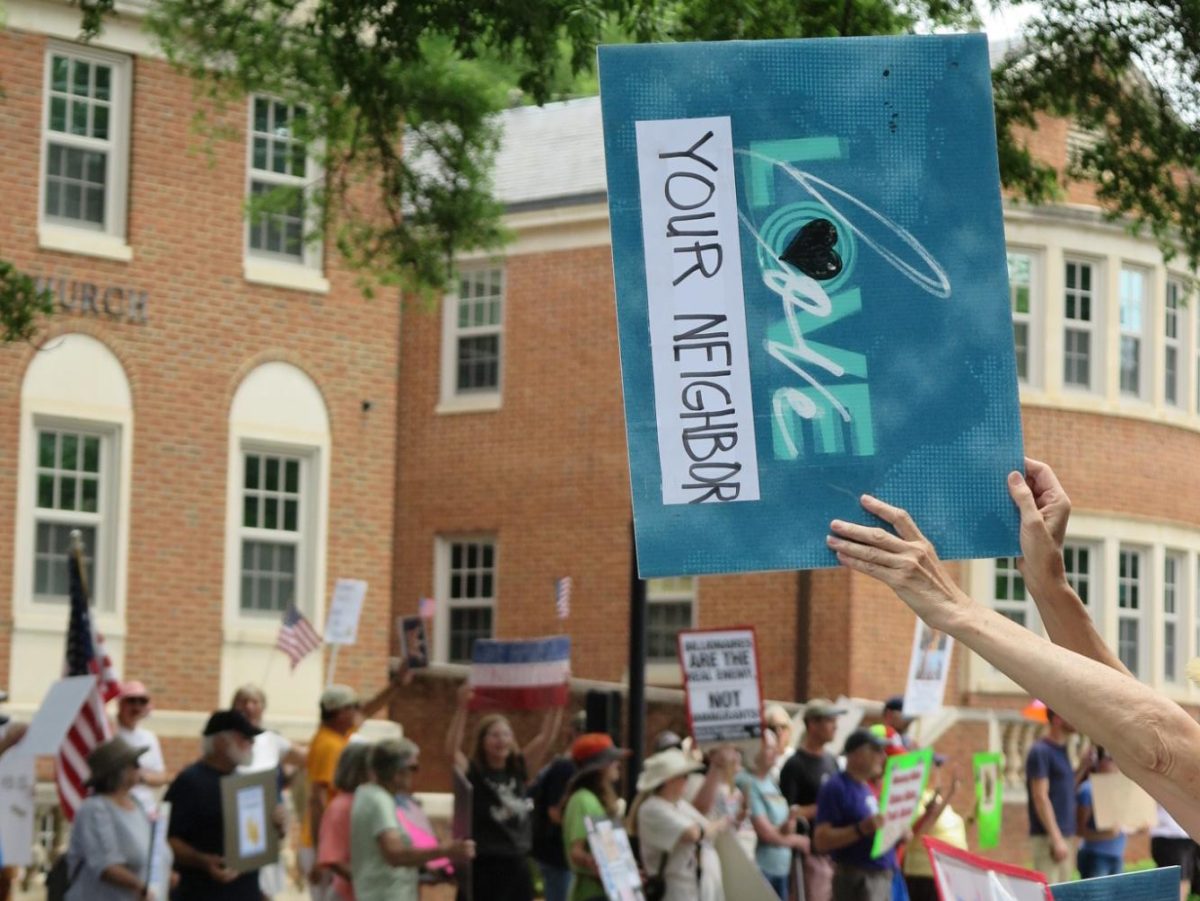
Stella Mackler
Sign held during a protest in the Town of Davidson earlier this summer.
It is October 2022. A deranged man breaks into the home of then-Speaker of the House, Nancy Pelosi, and bludgeons her husband Paul Pelosi with a hammer. It is July 2024. Then-former President Donald Trump defiantly raises his fist in the air, bleeding from the ear after having just been shot. It is June 2025. Two Democratic Minnesota lawmakers and their spouses are shot; one couple, Melissa and Mark Hortman, dies. Each time, you think this one will stick. But within a week, you forget. The news shifts, marching inexorably to the next story, but each time, with an almost-imperceptible jerk that unsettles your subconscious.
Now, it is September 2025: you scroll your Twitter timeline and see, willingly or unwillingly, the moment at which Charlie Kirk goes limp, life escaping his face as fast as blood unremittingly gushes from the hole in his neck. Perhaps for the first time (at the very moment in which he ceases to be a living human), you see Charlie Kirk as a real, recognizable human being rather than the physicalization of a series of beliefs that you abhor. Surely, this one will stick.
Each time, you keep the score in some small way; violence piling up in the back of your head as it forms a feeling of remarkable disorientation and desensitization. You are on edge walking the streets; you do not trust your neighbor. You wonder when it will be your family, your city, your neighbor. You open your choice short-form video app to distract yourself from the psychic damage engendered by the looming, omnipresent drone of violence, that constant unnerving buzz. Instead you are inundated with garbage: antihuman AI tech monopolists, political commentators set on fomenting a race war, the latest decimated building in Gaza. Everything, down to the very form of the infinite scroll, reinforces the sense of being whipped around, jerked from one episode to the next.
This is how I felt watching the latest installment in America’s ever-growing series of episodic, corrosive acts of political violence: the Kirk murder. I will resist the urge to spout moralistic platitudes about how we are “better” than this, and about how political violence has no place in this country. Evidently, it feels rather at home here.
If one is deranged enough to celebrate the murder of Mr. Kirk, they must recognize that they are celebrating nothing more than a crude act of childish revenge, because the modern American political assassin is motivated by no discernible political project. The modern American assassin, targeting prominent political figures of both major parties, is typically of inscrutable political ideology; a disaffected nihilist driven mad by the blood-filled media ecosystem that we all participate in and cheer on with our like buttons and with our fragmented attention spans.
Their violence is a form of acting out, a sick expression of an ineffable rage that only worsens the very conditions that drove them to violence. Indeed, our nation’s self-reinforcing pattern of political violence and mounting distrust of those we disagree with creates ever-greater political pretense for an authoritarian crackdown on individuals and the rapid acceleration of the surveillance state.
I wish there I had some sort of politically satisfying answer to all of this, but I fear that mine is frustratingly trite: do not kill people, and do not celebrate the killing of people. The way out of the modern American hellscape rests exclusively in a recognition of our shared humanity, and an affirmation of the ideals and kind of virtue that seems to have been proven outdated by the rank depravity of our current age.
America’s reaction to deeds like the one we saw this Wednesday should be a radical, perhaps illogical expression of mourning. Mourning for the fact that the ideological battlefield has become a physical one; mourning for Kirk’s children left without a father; mourning for the fact that our absurd desensitization—by way of constant exposure to the barbaric acts we see perpetrated both at home and abroad—has caused us to react to human slaughter with ironic indifference and calls to retaliative violence.
It is no mistake that the latest casualty of American political warfare happened on a college campus: these supposedly sacrosanct silos of intellectual betterment and respectful discourse defaced and spat on with impunity by the assassin’s bullet.
Here at Davidson, let us abhor one another’s beliefs, maybe sometimes even one another. I will not deny that beliefs have consequences; they do, and they should. Those consequences, however, cannot ever extend into the physical realm. We can disagree vehemently, angrily, sometimes even hatefully, but let us do so in a way that celebrates and defends human life instead of coming at the expense of it.
*The opinions expressed in this piece are the author’s own and do not represent the views of The Davidsonian.